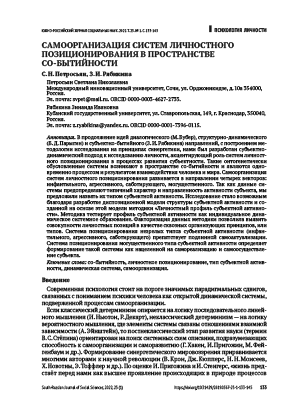Аннотация
В продолжение идей диалогического (М. Бубер), структурно-динамического (Б. Д. Парыгин) и субъектно-бытийного (З. И. Рябикина) направлений, с построением методологии исследования на принципах синергетики, нами был разработан субъектно-динамический подход к исследованию личности, акцентирующий роль систем личностного позиционирования в процессах развития субъектности. Такие онтогенетически обусловленные системы возникают в пространстве со-бытийности и являются одновременно процессом и результатом взаимодействия человека и мира. Самоорганизация систем личностного позиционирования развивается в направлении четырех векторов: инфантильного, агрессивного, саботирующего, могущественного. Так как данные системы предопределяют типичный характер и направленность активности субъекта, мы предложили назвать их типом субъектной активности. Исследование стало возможным благодаря разработке диспозиционной модели структуры субъектной активности и созданной на основе этой модели методики «Личностный профиль субъектной активности». Методика тестирует профиль субъектной активности как индивидуальное динамическое системное образование. Факторизация данных методики позволила выявить совокупности личностных позиций в качестве сквозных организующих принципов, или типов. Система позиционирования незрелых типов субъектной активности (инфантильного, агрессивного, саботирующего) препятствует подлинной самоактуализации. Система позиционирования могущественного типа субъектной активности определяет формирование такой системы как нацеленной на самореализацию и самоосуществление субъекта.
Ключевые слова
Библиографические ссылки
Allport, G. (1937). Personality: A Psychological Interpretation. New York: Holt, Rinehart, & Winston.
Bandura, A. (1999). A Social Cognitive Theory of Personality. In L. Pervin & O. John (Ed.), Handbook of Personality (pp. 154–196). New York: Guilford Publications.
Bourdieu, P. (1993). Sotsiologiya politiki [Sociology of Politics]. Moscow: Socio-Logos.
Buber, M. (1995). Dva obraza very [Two types of faith]. Moscow: Respublika.
Giordano, P. (2015). Being or Becoming: Toward an Open-System, Process-Centric Model of Personality. Integrative psychological & Behavioral Science, 49. DOI: 10.1007/s12124–015–9329-z
Giordano, P. J. (2017). Individual Personality is Best Understood as Process, not Structure: A Confucian Inspired Perspective. Culture & Psychology, 23(4), 502–518.
Hjelle, L., Ziegler, D. (1981). Personality Theories. Basic Assumptions, Research, and Applications. New York: McGraw-Hill
Knyazeva, Ye. N., Kurdyumov, S. P. (1994). Zakony evolyutsii i samoorganizatsii slozhnykh system [Laws of Evolution and Self-Organization of Complex Systems]. Moskva: Nauka.
Knyazeva, Ye. N., Kurdyumov, S. P. (2002). Osnovaniya sinergetiki: Rezhimy s obostreniyem, samoorganizatsiya, tempomiry [Foundations of Synergetics: Regimes with Aggravation, Self-Organization, and Temporal World]. Sankt-Peterburg: Aleteyya.
Kuper, N., Modersitzki, N., Phan, Le Vy & Rauthmann, J. (2020). The Dynamics, Processes, Mechanisms, and Functioning of Personality: An Overview of the Field. British Journal of Psychology, 112, DOI: 10.1111/bjop.12486
Milnor, J. (1985). On the Concept of Attractor. Communications in Mathematical Physics, 99, 177–195.
Mironenko, I. A. (2018, February/June). Personality as a Social Process: Where Peter Giordano meets Boris Parygin. Integrative Psychological and Behavioral Science, 52(4). DOI: 10.1007/s12124-018-9417-y
Mungalov, V. N. (2012). Psikhologicheskiye prostranstva cheloveka [Psychological Human Space]. Sibirskiy psikhologicheskiy zhurnal [Siberian Psychological Journal], 45, 104–111.
Nowak, A., Vallacher, R. & Zochowski, M. (2005). The Emergence of Personality: Dynamic Foundations of Individual Variation. Developmental Review, 25, 351–385. DOI: 10.1016/j.dr.2005.10.004
Parygin, B. D. (1999). Sotsial’naya psikhologiya. Problemy metodologii, istorii i teorii [Social Psychology. Problems of Methodology, History and Theory]. Sankt-Peterburg: IGUP.
Petros’yan, S. N., Ryabikina, Z. I. (2020). Tipy sub»yektnoy aktivnosti: sub»yektno-bytiynyy podkhod [Types of Subjective Activity: the Subject-being Approach]. In Z. I. Ryabikina, V. V. Znakov (Eds) Lichnost’ i vyzovy sovremennosti: interpretatsiya problem razlichnymi nauchnymi shkolami [Personality and the Challenges of Modernity: Interpretation of Problems by Different Scientific Schools] (pp. 54–57). Maykop: Adygeyskiy gos. un-t; Krasnodar: Kubanskiy gos. un-t.
Petros’yan, S. N., Ryabikina, Z. I., Gubanova, N. Yu. (2021). Strukturnaya validnost’ metodiki “Lichnostnyy profil’ sub»yektnoy aktivnosti” [Structural Validity of The Methodology «Personality’s Agency Activity (PAA) Profile”]. Gumanizatsiya obrazovaniya [Humanization of Education], 1, 41–58. DOI: 10.24411/1029-3388-2020-10148
Petros’yan, S. N., Ryabikina, Z. I., Gubanova, N. Yu., Simavoryan, S. Zh. (2021). Standartizatsiya metodiki “Lichnostnyy profil’ sub’’yektnoy aktivnosti” [Standardization of the methodology “Personality’s Agentic Activity (PAA) Profile”]. Nauchnyye issledovaniya i razrabotki. Sotsial’no-gumanitarnyye issledovaniya i tekhnologii [Scientific Research and Development. Socio-Humanitarian Research and Technology], 10(3), 45–56. DOI: 10.12737/2306-1731-2021-10-3-45-56.
Richardson, M. J., Dale, R., & Marsh, K. L. (2014). Complex Dynamical Systems in Social and Personality Psychology: Theory, Modeling, and Analysis. In H. T. Reis, & C. M. Judd (Eds) Handbook of Research Methods in Social and Personality Psychology (pp. 253–282). Cambridge University Press.
Rubinshteyn, S. L. (2012). Chelovek i mir [Person and World]. Sankt-Peterburg: Piter.
Ryabikina, Z. I. (2013). Perspektivy issledovaniy lichnosti s teoretiko-metodologicheskikh pozitsiy psikhologii sub»yekta [Prospects of Investigating a Personality from Theoretical-Methodological Position of a Subject Psychology]. Chelovek. Soobshchestvo. Upravleniye [Human. Community. Management], 3, 6–19.
Sato, T., Hidaka, T., Fukuda, M. (2009). Depicting the Dynamics of Living the Life: The Trajectory Equifinality Model. In Dynamic Process Methodology in the Social and Developmental Sciences (pp.217–240). New York: Springer.
Sergiyenko, Ye. A. (2013). Problema sootnosheniya ponyatiy sub»yekta i lichnosti [The Problem of Relationship Between Subject and Personality]. Psikhologicheskiy zhurnal [Psikhologicheskii Zhurnal], 34(2), 5–16.
Vallacher, R. R., Read S. J., Nowak A. (2002). The Dynamical Perspective in Personality and Social Psychology. Personality and Social Psychology Review, 6, 264–263. DOI: 10.1207/S15327957PSPR0604_01
Valsiner, J. & Sato, Tatsuya. (2006). Historically Structured Sampling (HSS): How Can Psychology’s Methodology Become Tuned in to the Reality of the Historical Nature of Cultural Psychology? DOI: 10.14361/9783839402344-010
Valsiner, J. (2009). Integrating psychology within the Globalizing World: A Requiem to the Post-Modernist Experiment with Wissenschaft. Integrative Psychological and Behavioral Science, 43(1), 1–21.
Valsiner, J. (2017). Between Self and Societies: Creating Psychology in a New Key. Tallinn: TLU Press
Zhuravlev, A. L., Mironenko, I. A. (2012). Sistema nauchnykh predstavleniy B. D. Parygina v oblasti sotsial’noy psikhologii [System of B. D. Parygins Scientific Conceptions in The Sphere of Social Psychology]. Psikhologicheskiy zhurnal [Psikhologicheskii Zhurnal], 33(5), 28–38.
Zhuravlev, A. L., Mironenko, I. A. (2016). Vklad Borisa Dmitrievicha Parygina v razvitie otechestvennoy sotsial’noy psikhologii [Contribution of B. D. Parygin to The Development of Russian Social Psychology]. Sotsial’naya i ekonomicheskaya psikhologiya [Social and Economic Psychology], 1(3), 4–23.
Znakov, V. V. (2019). Dinamicheskii podkhod k issledovaniiu lichnosti i protsessual’nyi analiz v psikhologii sub»ekta [Dynamic Approach to The Research of The Personality and The Procedural Analysis in Psychology of The Subject]. Psikhologicheskiy zhurnal [Psikhologicheskii Zhurnal], 40(5), 27–34. DOI: 10.31857/S020595920006073-6
Znakov, V. V., Riabikina, Z. I. (2017). Psikhologiya chelovecheskogo bytiia [Psychology of Human Existence]. Moscow: Smysl.


